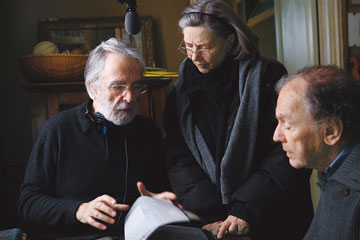
A married couple in their 80s--anne (Emmanuelle Riva) and Georges (Jean-Louis Trintignant)--stand up to infirmity and death. When Anne suffers several strokes that cripple her and rob her of speech, Georges dismisses their grown daughter (Isabelle Huppert) and a retinue of caregivers, deciding to care for Anne on his own in their Paris apartment. Though the prognosis is terminal, the couple's commitment is eternal. That's why the movie is called Amour.
Michael Haneke's end-of-life love story received all the honors expected for a work from Europe's most respected auteur: the 2012 Palme d'Or at Cannes and a slew of year-end reviewers' awards. No shock there; Haneke's severe, impeccable movies are caviar to the critics. Then on Jan. 10, the Motion Picture Academy trumped those accolades by nominating Amour for five Oscars: Best Picture, Director, Original Screenplay, Actress and Foreign Language Feature. It's the first film to earn all those lofty citations in the same year.
Soon expanding from showcases in Manhattan and Los Angeles to most other major North American cities, Amour could prove to be the rare example of a demanding, defiantly individualistic film that finds a wide audience. In Britain, the movie and its director have already inspired an impudently funny fake Twitter feed, in which someone posing as the elegant filmmaker raffishly declares his obsession with ginchy rom-coms like Sex and the City ("lately ive been such a samantha") and rhapsodizes about his cat's farts. The bogus account could be part of a brilliant stealth-marketing campaign, but the 70-year-old director said, "I'm not interested in that kind of thing."
In a feature-film career that began when he was 47, Haneke's kind of thing is investigating humanity's propensity for cruelty and the cinema's knack of manipulating its audience, which he sees as equally sadistic. Often his films end without explicitly resolving the central dilemma, and viewers study the final shots as if they were the grassy knoll in Dallas.
The end of Amour also leaves questions hanging, but it marks a change of tone and perhaps of heart for the Austrian director. (Because of his nationality, Amour was submitted to the Academy by Austria, not France.) The cruelty here is nature's need to let living things die and create a calvary of our last days. But as Georges and Anne demonstrate, the most dreadful challenges can trigger the most heroic responses, the greatest acts of love.
Is Amour too strong a dose of reality for older viewers? Mostly, no. They've embraced a film that confronts the decay most people eventually face and does so with simple eloquence and subtle ferocity. Viewers also connect with the acute performances of Trintignant, 82, star of such seminal '60s films as A Man and a Woman and Z, and Riva, 85, unforgettable in the 1959 Hiroshima, Mon Amour.
Last year the silent comedy The Artist, made by the French director Michel Hazanavicius, swept the Oscars. Haneke has much longer odds to take Best Picture on Oscar night, Feb. 24, which also happens to be Riva's 86th birthday. But wouldn't it be lovely if Amour conquered all?
FOR MORE OSCAR COVERAGE, GO TO entertainment.time.com
